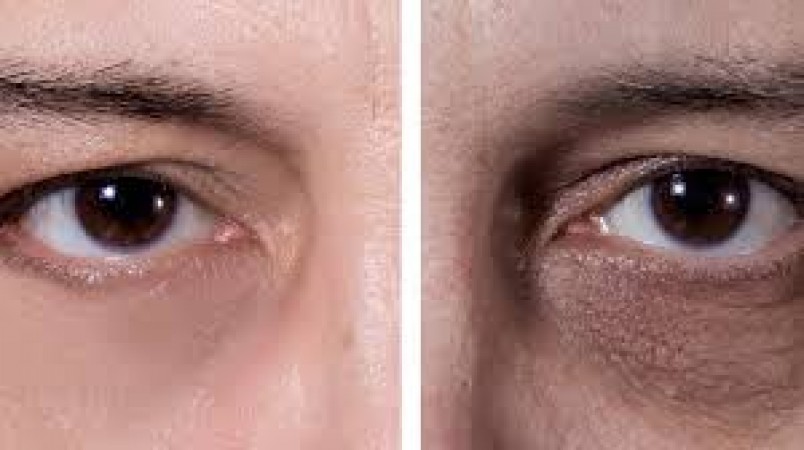
Stress and fatigue are major culprits behind the appearance of dark circles. When you're stressed or tired, your body releases cortisol, also known as the stress hormone. This can lead to dilated blood vessels and darker skin under your eyes.
Dehydration
Not drinking enough water can cause your skin to become dry and dull, making dark circles more prominent. When your body is dehydrated, your skin loses its elasticity, which can exaggerate the appearance of dark circles.
Poor Diet
A diet lacking in essential nutrients like vitamins C and K, as well as iron and antioxidants, can contribute to the formation of dark circles. These nutrients play a crucial role in maintaining healthy skin and reducing inflammation.
Allergies
Allergic reactions can cause inflammation and swelling around the eyes, leading to the appearance of dark circles. Common allergens include pollen, dust, pet dander, and certain foods.
Genetics
Genetics can also play a significant role in the development of dark circles. If your parents or other family members have dark circles, you're more likely to inherit them as well.
Sun Exposure
Excessive exposure to the sun's harmful UV rays can accelerate the production of melanin, the pigment responsible for skin color. This can darken the skin under your eyes and make dark circles more noticeable.
Aging
As you age, your skin naturally loses collagen and becomes thinner, making the blood vessels beneath the eyes more visible. This can result in the appearance of dark circles and wrinkles.
Smoking and Alcohol
Smoking and excessive alcohol consumption can have a detrimental effect on your skin's health. They can cause dehydration, reduce blood circulation, and damage collagen, all of which contribute to the formation of dark circles.
Rubbing or Scratching
Frequently rubbing or scratching the delicate skin around your eyes can lead to irritation and inflammation, making dark circles more prominent. It's essential to handle this area gently and avoid excessive rubbing.
Medical Conditions
Certain medical conditions, such as thyroid disorders, eczema, and sinus infections, can cause dark circles to appear. Treating the underlying condition may help reduce their severity.
Medications
Some medications, particularly those that dilate blood vessels, can contribute to the development of dark circles. If you suspect that your medication is causing this issue, consult your healthcare provider for alternative options.
Poor Sleep Quality
While lack of sleep is a well-known cause of dark circles, poor sleep quality can also contribute to their formation. Factors such as sleep apnea, insomnia, or irregular sleep patterns can affect blood circulation and skin health.
Fluid Retention
Fluid retention, also known as edema, can cause puffiness and swelling under the eyes, making dark circles more noticeable. This can be caused by factors such as salty food intake, hormonal changes, or underlying medical conditions.
Anemia
Anemia, a condition characterized by low levels of red blood cells or hemoglobin, can result in pale skin and dark circles under the eyes. Iron deficiency is a common cause of anemia and may require dietary changes or supplementation.
Eye Strain
Spending long hours staring at screens or reading in poor lighting conditions can strain your eyes and lead to the appearance of dark circles. Taking regular breaks and ensuring adequate lighting can help reduce eye strain.
Sleep Position
Sleeping on your stomach or side can cause fluid to pool under your eyes, leading to puffiness and dark circles. Try sleeping on your back with an extra pillow to elevate your head and promote better circulation.
Hormonal Changes
Hormonal fluctuations, such as those experienced during menstruation, pregnancy, or menopause, can affect blood flow and collagen production, contributing to the formation of dark circles.
Excessive Salt Intake
Consuming too much salt can cause your body to retain water, leading to puffiness and fluid buildup under the eyes. This can exacerbate the appearance of dark circles, especially in combination with other factors.
Excessive Alcohol Consumption
Alcohol can dehydrate your body, causing the delicate skin under your eyes to appear darker and more sunken. Limiting your alcohol intake and staying hydrated can help prevent this.
Chronic Illness
Underlying chronic illnesses such as liver disease, kidney disease, or diabetes can manifest in various ways, including dark circles under the eyes. Managing these conditions with proper medical care may help improve the appearance of dark circles.
Environmental Factors
Exposure to environmental pollutants, such as air pollution and cigarette smoke, can contribute to skin damage and premature aging, including the formation of dark circles. Protecting your skin with sunscreen and avoiding smoke-filled environments can help mitigate this risk.
Inadequate Skincare Routine
Neglecting to moisturize and protect the delicate skin around your eyes can lead to dryness, fine lines, and dark circles. Establishing a consistent skincare routine that includes gentle cleansing, moisturizing, and sun protection can help improve the appearance of dark circles over time.
Lack of Exercise
A sedentary lifestyle can impair blood circulation and lymphatic drainage, leading to fluid retention and the appearance of dark circles. Incorporating regular exercise into your routine can improve circulation and promote healthier-looking skin.
Self-Care Practices
Engaging in self-care practices such as getting enough rest, staying hydrated, eating a balanced diet, and managing stress can all contribute to healthier-looking skin and reduce the appearance of dark circles. Prioritizing self-care can help you look and feel your best. Dark circles under the eyes can be caused by a variety of factors, including stress, dehydration, poor diet, allergies, genetics, sun exposure, aging, smoking, medications, medical conditions, poor sleep quality, fluid retention, anemia, eye strain, sleep position, hormonal changes, excessive salt intake, alcohol consumption, chronic illness, environmental factors, inadequate skincare, lack of exercise, and self-care practices. By addressing these underlying causes and implementing lifestyle changes, you can help reduce the appearance of dark circles and achieve healthier-looking skin overall.
Your dog will not feel hot, just keep these things in mind
Eat raw onion in summer, your health will remain healthy, know its 5 big benefits